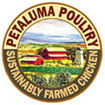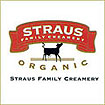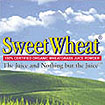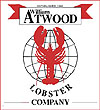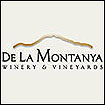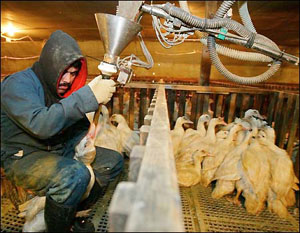
Chicago Says Farewell to Foie Gras as Ban Goes
Into Effect
These
are dangerous times for ducks and geese in Chicago.
With the city's ban on foie gras — a delicacy
made of duck or goose liver — just days
away from going into effect, upscale restaurants
in the city are serving it up like never before.
They have put together special menus with names
like "Foie Gras, Farewell To Our Good Friend"
featuring that friend in course after course —
searing it, chilling it, throwing it into salads
and turning it into sauce.
At the same time, foie gras enthusiasts are cooking
up a lawsuit to keep it on the menu in the city
or put it back after the ban goes into effect
Aug. 22, holding fundraisers to finance their
foie gras fight and asking diners to sign petitions
in support of that fight.
And those diners? They are savoring it a lot more
— or at least more often — than they
would have had the City Council not voted in April
to side with animal rights activists and ban it
because of what the activists say is the inhumane
way the geese and ducks are force-fed to make
their livers bigger.
"There are other things I might have ordered
but I thought I'm on the clock," said Ben
Goldhirsh, who recently enjoyed the extensive
"Foie Gras, Farewell To Our Good Friend"
menu at MK, a trendy downtown restaurant.
But to the chefs who prepare the buttery indulgence
and the customers who do the indulging, this is
more than a last hurrah for foie gras. This is
a chance not only to wrap their mouths around
foie gras, but also to wrap foie gras in the flag.
"They're going too far when they're telling
you what to eat, what not to eat," said Mario
Lara, who was concerned enough about the issue
to buy a table for four at a foie gras fundraiser
at Cyrano's Bistrot & Wine Bar. "This
is America."
And sounding more like politicians talking about
the Middle East than a piece of meat that gets
its size by sticking a tube down a bird's throat
and force-feeding it, enthusiasts voice their
concern that foie gras will not be the last tasty
treat to make its way from menu to city ordinance.
Will veal be next? Lobster? And what about that
fur coat in the closet?
"It's a slippery slope," Goldhirsh said.
Given animal rights activists' success getting
foie gras banned in Chicago, Chef Didier Durand
is confident they will take aim at other foods
as well. "Pretty soon we're going to be eating
grass," he said.
That helps explain why a group of distributors,
producers, processors and others in the foie gras
business have formed the North American Foie Gras
Association and hired a lobbyist to make their
case as other U.S. cities contemplate following
Chicago's lead.
That effort includes not only examining legal
and legislative options, but also getting the
word out that despite what animal activists say,
ducks and geese raised for their liver do not
have it so bad, certainly not as bad as animal
rights activists say they have it.
For one thing, unlike chickens who can spend their
entire lives in small pens with several other
chickens, never seeing the light of day, ducks
and geese raised for foie gras spend their first
12 to 14 weeks walking around in open areas, said
Bryan Scott, the group's lobbyist. It is not until
the last two to four weeks of their lives that
the birds are brought into individual cages and
force fed through a pipe to turn a regular-sized
liver into foie gras. And even that process, he
said, is not painful.
"By everybody's account it is not,"
he said.
Well, maybe not everybody. One of Chicago's most
famous chefs, Charlie Trotter, took foie gras
off the menu at his restaurant after seeing how
it is produced.
Related
Stories
•
Chicago
Cracks Down With Bans on Foie Gras, Smoking
•
Philadelphia
Council Man Tries for Ban on Foie Gras
•
Philadelphia
City Councilman Wants Foie Gras Ban
•
Chicago
Food Fight Turns Ugly Over Foie Gras







